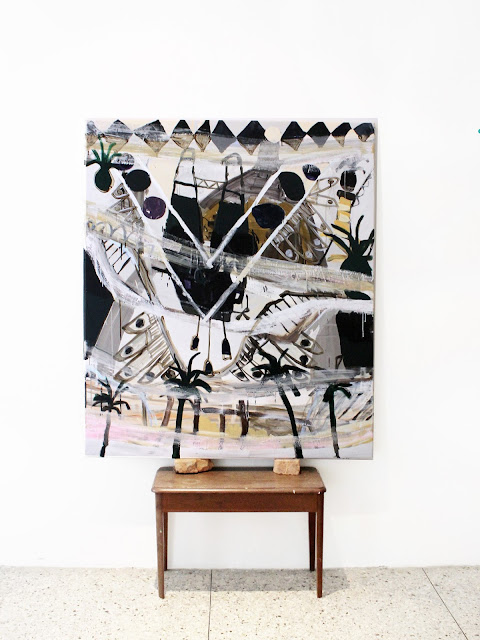April 16 - October 18 2016
Mie Olise Kjærgaard
Museo de Arte Acarigua-Araure, Venezuela.
http://museoaaa.org/vzla/
weaving, in 3 layers, fabric, string, 2016
170x190 cm, 2016
Installation at Museo de Arte Acarigua.
Hammock, dicplaced, canvas+string, 190x170x17 cm, 2016
170x190 cm, 2016
Installation at Museo de Arte Acarigua.
Weaving 2 layers of fabric weaved + paint, 130x90x7 cm, 2016
200x200 cm, 2016
 Hammock, dicplaced, canvas+string, 190x170x17 cm, 2016
Hammock, dicplaced, canvas+string, 190x170x17 cm, 2016 100x100 cm, 2016
weaving, tablecloth, cut and weaved back together, 2016
Installation, canvas filtered through different waters, stick, plant collected from ruin, 250x180x80 cm, 2016
Boat with floor, pineapple and mountains. Acrylic on canvas, metal tubes. Dimensions variable, 2016
Pineapple on stool. painting, wood, chair stones. Dimensions variable. 2016
Ipomea Cairica, watercolour, A2, 2016
all photos: Dorte Krogh.
model of installation to be built on-site, wood, bricks, plant from museum garden, 2016
DISCONTINUED MONUMENTS.
Based on my research for the show in South America, where I
experienced multiple abandoned structures, as well as on my long time interest
in abandoned constructions, I wanted to work with the new ruins, newly built but abandoned constructions in VZLA, that gets occupied again and finished by a complete different set of rules than
initiated.
In architecture there is a term, ”Dishonest
Construction”, which means when a structure is not consistent in it´s
structural idea; when this happens because of political change and people takes
over an incomplete building to finish it in their own means – the architecture
becomes an image of the poltitical situation.
The change of strategies in layers, becomes an architecturally visual symbol of a system that does not work.
The change of strategies in layers, becomes an architecturally visual symbol of a system that does not work.
The Torre de David in Caragas is a famous example of
this, but it happens everywhere. A construction that
starts with one set of rules (architectural logic) and in layers changes its
rules (logic) along the way, according to the present.
When discussing the rules of honest and dishonest constructions as architecture, it´s refers to the fact if a building shows its
true construction. For example: Does it
show if the construction is based on pillars, concrete or bricks? And
can one build in brick on top of a pillar-construction? Or make a facade of
wood or brick, if it was meant to be glass?
In my project I have used this logic as a new way to operate after.
I became interested in the "lighter" architectural materials, such as fabric, found bricks and the plants that will grow on top of the new ruins, which finishes them. Weavings, fabric and plants -has entered my work, and the image of the window, which I saw finished in so many ways, with fabric, towels, bardboard, and bricks - other than the missing glassframes, has inspired the installations.
The exhibition is supported by:
In my project I have used this logic as a new way to operate after.
I became interested in the "lighter" architectural materials, such as fabric, found bricks and the plants that will grow on top of the new ruins, which finishes them. Weavings, fabric and plants -has entered my work, and the image of the window, which I saw finished in so many ways, with fabric, towels, bardboard, and bricks - other than the missing glassframes, has inspired the installations.
(changing strategies in layers) Found folding drawing / the internet.
The exhibition is supported by:



















